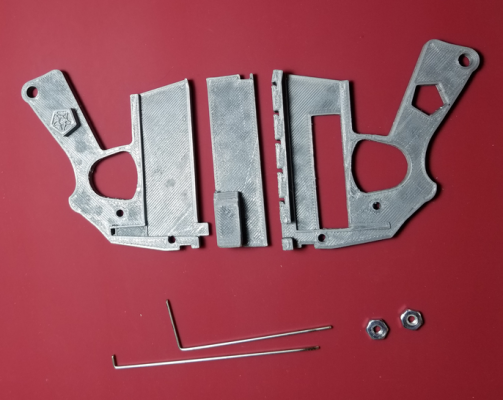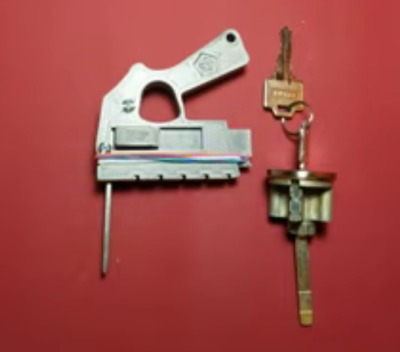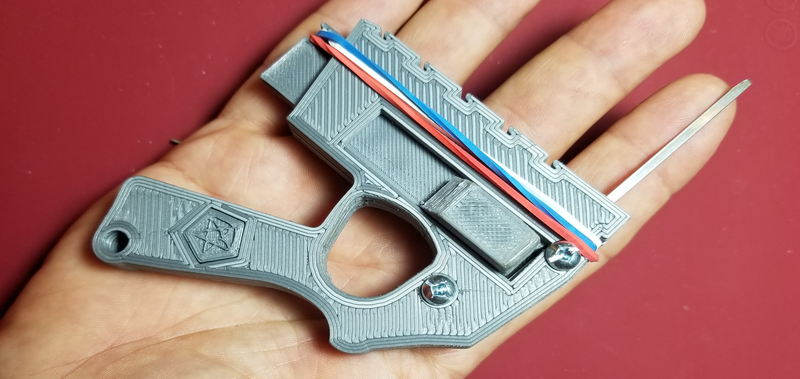At a far flung, wind blown, outpost of Hackaday, we were watching a spy film with a bottle of suitably cheap Russian vodka when suddenly a blonde triple agent presented a fascinating looking gadget to a lock and proceeded to unpick it automatically. We all know very well that we should not believe everything we see on TV, but this one stuck.
 Now, for us at least, fantasy became a reality as [Peterthinks] makes public his 3D printed lock picker – perfect for the budding CIA agent. Of course, the Russians have probably been using these kind of gadgets for much longer and their YouTube videos are much better, but to build one’s own machine takes it one step to the left of center.
Now, for us at least, fantasy became a reality as [Peterthinks] makes public his 3D printed lock picker – perfect for the budding CIA agent. Of course, the Russians have probably been using these kind of gadgets for much longer and their YouTube videos are much better, but to build one’s own machine takes it one step to the left of center.
 The device works by manually flicking the spring (rubber band) loaded side switch which then toggles the picking tang up and down whilst simultaneously using another tang to gently prime the opening rotator.
The device works by manually flicking the spring (rubber band) loaded side switch which then toggles the picking tang up and down whilst simultaneously using another tang to gently prime the opening rotator.
The size of the device makes it perfect to carry around in a back pocket, waiting for the chance to become a hero in the local supermarket car park when somebody inevitably locks their keys in their car, or even use it in your day job as a secret agent. Just make sure you have your CIA, MI6 or KGB credentials to hand in case you get searched by the cops or they might think you were just a casual burglar. Diplomatic immunity, or a ‘license to pick’ would also be useful, if you can get one.
As mentioned earlier, [Peter’s] video is not the best one to explain lock picking, but he definitely gets the prize for stealth. His videos are below the break.
In the meantime, all we need now are some 3D printed tangs.
















Good luck picking a European door lock with that – seems more suitable for small children’s diary locks :).
many locks here will be susseptible against this attack, only the expensive ones will resist enough to call this attack not feasible…
Eastern European locks can be just as bad as American locks, and are commonly used either because they are old and have not been replaced, or because they are cheaply available.
Most Americans respect European made locks because the market is set up such that only high-cost high-margin products make it over from Europe (also our fat American picks can’t fit in the slim keyways, haha). Europe simply can’t compete on low price, unlike Asia, India, and the Americas. When they build for export, they build for excellence.
Still you can find products from Western European manufactures that are still relatively easy to pick. The lower cost ABUS (German) bike locks are pretty reasonably easy to pick even though they have security spools.
That lock he’s picking in the video looks identical to the Yale-type lock I replaced just the other day. There’s certainly better locks out there, but I think 90% of the doors I see in the UK have one just like that on them.
I think you picked a winner here, locked in the real story, hacks and how to look even more guilty owning a 3d printer. :-)
“…waiting for the chance to become a hero in the local supermarket car park when somebody inevitably locks their keys in their car…”
Maybe you’ll find a chance to become a hero, but it wouldn’t be from using this successfully on a car lock. Please do a little research on the topic you write on, if you aren’t familiar. There are very few old cars that use pin tumbler locks that this might work on. In general, wafer and slide locks will be the most seen in the wild.
Here’s an explanation about why bump keys don’t work. Same principle.
https://unitedlocksmith.net/blog/why-bump-keys-dont-work-on-cars
Sorry darkspr1te, my comment wasn’t supposed to be a reply to you. Not sure how that happened
Enjoy your 2 years of state sponsored holidays if you’re in Europe and not a govt. licensed locksmith. I did my time for having a hobby, never again.
Odd. My local European hackerspace has a regular meetup.
https://toool.nl/Toool
https://blog.ssdev.org/?page_id=242
maybe his hobby was breaking and entering with a lock pick :P
So ‘License to pick’ might not have been such a stupid idea?
I call bullshit on this.
I mean you even can get lockpicking sets on fucking Pearl these days. It was on the front page of their printed catalog, sent in a clear wrap. Already got mine from China when I saw it, though. Declared as locksmithing tools or even lockpicks, at least it was pretty obvious what was in the letter.
Britain and Germany != Europe… Most of EU is fine with owning lock picking gear unless you actually use it to break and enter
p.s. it’s not sponsored, you have to pay the state back once you’re released…
But lockpicking is _legal_ in Germany! AFAIK, the idea of lockpicking as “organized” sport originated here. (Germans will organize anything!)
I think the original comment is pure FUD.
It’s not impossible.
In the U.K. you can be done for “going equipped for theft or burglary”. Carrying a lockpick set could certainly qualify, if you’ve not got a good reason / they’ve got a reason to believe you’re intending to burgle.
In practice, they’ve got to (a) stop and search you, (b) decide to make a big deal out of it. Which means if they’ve specifically decided to stop you, they’re probably already looking to get you.
If you’ve got a good case to carry them (a locksmith, going to a locksport event), then you’re probably ok.
But as with many such relatively minor offences, if you’ve got prior history, are carrying drugs, arsy with the officer, etc, they could decide to prosecute.
“the idea of lockpicking as “organized” sport originated here. ”
Is it an Olympic competition yet?
B^)
Wouldn’t that story be more suited to Crackaday? Exciting spy business, or for characteristically drug addicted home burglars?
If any drug addicted home burglar had a 3D printer he’d sell it for crack before printing a lock pick, and the average B&E skill lever of a crack is a brick through a window.
I stand corrected. All hackers ARE crackers, and I was incorrect to suggest the article was beneath the moral and ethical standards of the website and it’s readership.
CLEARLY it is not!
Stop ranting. If you read carefully, you’ll see that he’s talking about *unpicking* locks
Wah, wah, wah!
*laughs in LockPickingLawyer*
Judging from the comments so far, I’m guessing that many people are unaware that there is a whole hobby based around legal lock picking. One aspect of that hobby I find particularly interesting are “challenge locks”, which are locks that are specially built by hobbyists to make them as difficult to pick as possible while still operating similarly to an unmodified lock cylinder (opens with key, operates smoothly, etc.).
The two YouTube channels that I am familiar with that focus on this sort of thing are Lock Picking Lawyer and Bosnian Bill.
Bosnian Bill is awesome.
Also no need for a 3d printed lockpicking gun. When you watch Bill’s videos, you learn that you can open a lock like the one in the video without any special tools.
you need special skill instead of special tools. I can build a special tool on a Saturday afternoon. It takes many hours to develop a special skill. Which explains why I’m more likely to build or modify guitar pedals than to actually learn how to play guitar decently.
This seems like bitch picking with more hardware :D
“and proceeded to unpick it” What? Locked the door then right? Reminds me of my wife saying “get some hamburger out of the freezer and set it on the counter to dethaw”. :P
“I have 6 locks on my front door.
But, I only lock 3, so if someone picks the locks,
they’ve just locked 3 of them.”
-Steven Wright
Countdown timer to NJ banning the .stl has been activated.
I like this idea. Make it reciprocate multiple times and you have a winner
I am considering it. But I like that it is so simple.